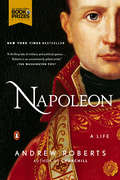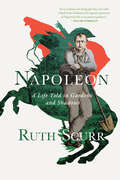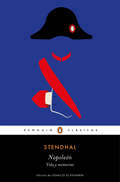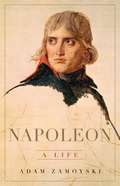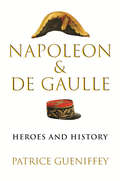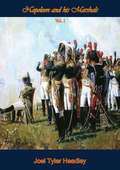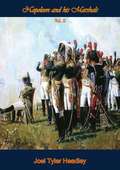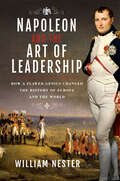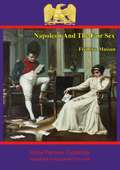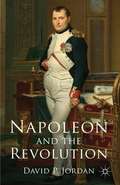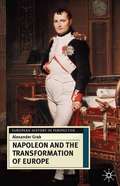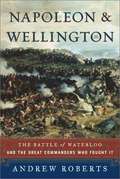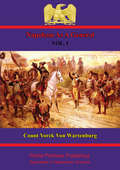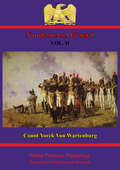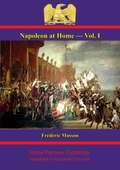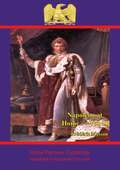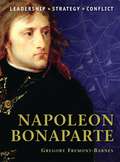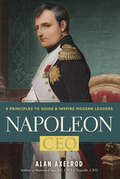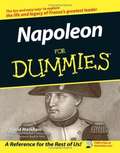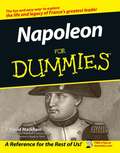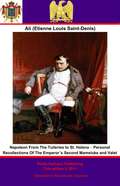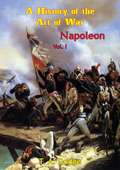- Table View
- List View
Napoleon: A Life
by Andrew RobertsThe definitive biography of the great soldier-statesman by the New York Times bestselling author of The Storm of War--winner of the Los Angeles Times Book Prize for Biography and the Grand Prix of the Fondation Napoleon Austerlitz, Borodino, Waterloo: his battles are among the greatest in history, but Napoleon Bonaparte was far more than a military genius and astute leader of men. Like George Washington and his own hero Julius Caesar, he was one of the greatest soldier-statesmen of all times. Andrew Roberts's Napoleon is the first one-volume biography to take advantage of the recent publication of Napoleon's thirty-three thousand letters, which radically transform our understanding of his character and motivation. At last we see him as he was: protean multitasker, decisive, surprisingly willing to forgive his enemies and his errant wife Josephine. Like Churchill, he understood the strategic importance of telling his own story, and his memoirs, dictated from exile on St. Helena, became the single bestselling book of the nineteenth century. An award-winning historian, Roberts traveled to fifty-three of Napoleon's sixty battle sites, discovered crucial new documents in archives, and even made the long trip by boat to St. Helena. He is as acute in his understanding of politics as he is of military history. Here at last is a biography worthy of its subject: magisterial, insightful, beautifully written, by one of our foremost historians.From the Hardcover edition.
Napoleon: A Life Told In Gardens And Shadows
by Ruth ScurrMarking the 200th anniversary of his death, Napoleon is an unprecedented portrait of the emperor told through his engagement with the natural world. “How should one envisage this subject? With a great pomp of words, or with simplicity?” —Charlotte Brontë, “The Death of Napoleon” The most celebrated general in history, Napoleon Bonaparte (1769–1821) has for centuries attracted eminent male writers. Since Thomas Carlyle first christened him “our last Great Man,” regiments of biographers have marched across the same territory, weighing campaigns and conflicts, military tactics and power politics. Yet in all this time, no definitive portrait of Napoleon has endured, and a mere handful of women have written his biography—a fact that surely would have pleased him. With Napoleon, Ruth Scurr, one of our most eloquent and original historians, emphatically rejects the shibboleth of the “Great Man” theory of history, instead following the dramatic trajectory of Napoleon’s life through gardens, parks, and forests. As Scurr reveals, gardening was the first and last love of Napoleon, offering him a retreat from the manifold frustrations of war and politics. Gardens were, at the same time, a mirror image to the battlefields on which he fought, discrete settings in which terrain and weather were as important as they were in combat, but for creative rather than destructive purposes. Drawing on a wealth of contemporary and historical scholarship, and taking us from his early days at the military school in Brienne-le-Château through his canny seizure of power and eventual exile, Napoleon frames the general’s story through the green spaces he cultivated. Amid Corsican olive groves, ornate menageries in Paris, and lone garden plots on the island of Saint Helena, Scurr introduces a diverse cast of scientists, architects, family members, and gardeners, all of whom stood in the shadows of Napoleon’s meteoric rise and fall. Building a cumulative panorama, she offers indelible portraits of Augustin Bon Joseph de Robespierre, the younger brother of Maximilien Robespierre, who used his position to advance Napoleon’s career; Marianne Peusol, the fourteen-year-old girl manipulated into a Christmas-Eve assassination attempt on Napoleon that resulted in her death; and Emmanuel, comte de Las Cases, the atlas maker to whom Napoleon dictated his memoirs. As Scurr contends, Napoleon’s dealings with these people offer unusual and unguarded opportunities to see how he grafted a new empire onto the remnants of the ancien régime and the French Revolution. Epic in scale and novelistic in its detail, Napoleon, with stunning illustrations, is a work of revelatory range and depth, revealing the contours of the general’s personality and power as no conventional biography can.
Napoleón: Fragments (classic Reprint) (El\libro Aguilar Ser.)
by StendhalConmemoramos los 250 años del nacimiento de Napoleón con esta biografía escrita de la mano de un testimonio excepcional, Stendhal. «Se trata, en efecto, del hombre más grande aparecido en el mundo desde César.» Este volumen reúne los dos intentos de Stendhal de escribir la biografía de Napoleón. Durante años se dedicó a reunir el material necesario para llevar a cabo este gran proyecto pero no llegó a terminarlo. Empezó a escribir Vida de Napoleón en 1817 cuando, a pesar de que Bonaparte ya se encontraba en el exilio, Stendhal todavía creía en su empresa. En esta primera biografía se centra en sus hazañas militares y en su experiencia como combatiente en las guerras napoleónicas. En Memorias de Napoleón, escritas en 1832, desengañado por una Francia que parecía haber olvidado el canto a la libertad, se centra en el símbolo que supuso el personaje y no duda en afirmar que aborrece al tirano pero adora poéticamente su grandeza. La presente edición incluye una magnífica introducción de Ignacio Echevarría que nos acerca a la intimidad histórica con la que Stendhal dibuja el retrato de Napoleón. El texto ha sido vertido al español por Consuelo Bergés, reconocida experta en Stendhal y traductora de la obra completa.
Napoleon: A Life
by Adam ZamoyskiThe definitive biography of Napoleon, revealing the true man behind the legend"What a novel my life has been!" Napoleon once said of himself. Born into a poor family, the callow young man was, by twenty-six, an army general. Seduced by an older woman, his marriage transformed him into a galvanizing military commander. The Pope crowned him as Emperor of the French when he was only thirty-five. Within a few years, he became the effective master of Europe, his power unparalleled in modern history. His downfall was no less dramatic.The story of Napoleon has been written many times. In some versions, he is a military genius, in others a war-obsessed tyrant. Here, historian Adam Zamoyski cuts through the mythology and explains Napoleon against the background of the European Enlightenment, and what he was himself seeking to achieve. This most famous of men is also the most hidden of men, and Zamoyski dives deeper than any previous biographer to find him. Beautifully written, Napoleon brilliantly sets the man in his European context.
Napoleon and de Gaulle: Heroes and History
by Patrice GueniffeyOne of France’s most famous historians compares two exemplars of political and military leadership to make the unfashionable case that individuals, for better and worse, matter in history. Historians have taught us that the past is not just a tale of heroes and wars. The anonymous millions matter and are active agents of change. But in democratizing history, we have lost track of the outsized role that individual will and charisma can play in shaping the world, especially in moments of extreme tumult. Patrice Gueniffey provides a compelling reminder in this powerful dual biography of two transformative leaders, Napoleon Bonaparte and Charles de Gaulle. Both became national figures at times of crisis and war. They were hailed as saviors and were eager to embrace the label. They were also animated by quests for personal and national greatness, by the desire to raise France above itself and lead it on a mission to enlighten the world. Both united an embattled nation, returned it to dignity, and left a permanent political legacy—in Napoleon’s case, a form of administration and a body of civil law; in de Gaulle’s case, new political institutions. Gueniffey compares Napoleon’s and de Gaulle’s journeys to power; their methods; their ideas and writings, notably about war; and their postmortem reputations. He also contrasts their weaknesses: Napoleon’s limitless ambitions and appetite for war and de Gaulle’s capacity for cruelty, manifested most clearly in Algeria. They were men of genuine talent and achievement, with flaws almost as pronounced as their strengths. As many nations, not least France, struggle to find their soul in a rapidly changing world, Gueniffey shows us what a difference an extraordinary leader can make.
Napoleon and his Marshals - Vol I (Napoleon and his Marshals #1)
by Pickle Partners Publishing Joel Tyler HeadleyThis ebook is purpose built and is proof-read and re-type set from the original to provide an outstanding experience of reflowing text for an ebook reader. J. T. Headley was born at the very end of the convulsive period of the French revolution and Napoleonic Wars that followed, and wrote a number of volumes on the French army and its leadership of the period. An admirer of the equality and liberty that Napoleon and the Napoleonic Myth expounded, Headley takes an interesting and entertaining view of Napoleon and his Marshals. The glittering array of military talent available to Napoleon, was formed by the upsurge in manpower revolutionary levée en masse and the egalitarian principals. Whilst not an absolute meritocracy, a great number of Generals and indeed Marshals came from humble backgrounds. In this volume, the author charts the careers of Napoleon, Marshals Murat, Lefebvre, Massena, Marmont, Victor, Brune, Oudinot, Bessières, Jourdan, Bernadotte, Suchet, Poniatowski, Grouchy and Ney Text taken, whole and complete, from the 1846 edition published in New York by Baker and Scribner. Original 316 pages.
Napoleon and his Marshals - Vol II (Napoleon and his Marshals #2)
by Joel Tyler Headley Pickle Partners PublishingThis ebook is purpose built and is proof-read and re-type set from the original to provide an outstanding experience of reflowing text for an ebook reader. J. T. Headley was born at the very end of the convulsive period of the French revolution and Napoleonic Wars that followed, and wrote a number of volumes on the French army and its leadership of the period. An admirer of the equality and liberty that Napoleon and the Napoleonic Myth expounded, Headley takes an interesting and entertaining view of Napoleon and his Marshals. The glittering array of military talent available to Napoleon, was formed by the upsurge in manpower revolutionary levée en masse and the egalitarian principals. Whilst not an absolute meritocracy, a great number of Generals and indeed Marshals came from humble backgrounds. In this volume, the author charts the careers of Napoleon, Marshals Murat, Lefebvre, Massena, Marmont, Victor, Brune, Oudinot, Bessières, Jourdan, Bernadotte, Suchet, Poniatowski, Grouchy and Ney. Text taken, whole and complete, from the 1846 edition published in New York by Baker and Scribner. Original 316 pages.
Napoleon and the Art of Leadership: How a Flawed Genius Changed the History of Europe and the World
by William NesterThis deep dive into the mind of the complex, controversial political and military leader is “a great addition to the field of Napoleonics” (Journal of Military History).No historical figure has provoked more controversy than Napoleon Bonaparte. Was he an enlightened ruler or brutal tyrant? An insatiable warmonger or a defender of France against the aggression of the other great powers? Kind or cruel, farsighted or blinkered, a sophisticate or a philistine, a builder or a destroyer? Napoleon was at once all that his partisans laud, his enemies condemn, and much more. He remains fascinating, because he so dramatically changed the course of history and had such a complex, paradoxical character.One thing is certain: If the art of leadership is about getting what one wants, then Napoleon was among history’s greatest masters. He understood and asserted the dynamic relationship among military, economic, diplomatic, technological, cultural, psychological—and thus political—power. War was the medium through which he was able to demonstrate his innate skills, leading his armies to victories across Europe. He overthrew France’s corrupt republican government in a coup, then asserted near dictatorial powers. Those powers were then wielded with great dexterity in transforming France from feudalism to modernity with a new law code, canals, roads, ports, schools, factories, national bank, currency, and standard weights and measures. With those successes, he convinced the Senate to proclaim him France’s emperor and even got the pope to preside over his coronation. He reorganized swaths of Europe into new states and placed his brothers and sisters on the thrones.This is Napoleon as has never been seen before. No previous book has explored his seething labyrinth of a mind more deeply and broadly or revealed more of its complex, provocative, and paradoxical dimensions. Napoleon has never before spoken so thoroughly about his life and times through the pages of a book, nor has an author so deftly examined the veracity or mendacity of his words. Within are dimensions of Napoleon that may charm, appall, or perplex, many buried for two centuries and brought to light for the first time. Napoleon and the Art of Leadership is a psychologically penetrating study of the man who had such a profound effect on the world around him that the entire era still bears his name.
Napoleon and the Fair Sex
by Anon. Frédéric MassonFrédéric Masson stands as one of the foremost historians that France has ever produced. His specialist subject was the era of Napoleon, and few men have written such brilliant and penetrating studies of the Emperor. In this volume, translated from his book 'Napoléon et les femmes', Masson charts the Emperor's amorous adventures throughout his life. It is a wonder that Napoleon had any time to engage in the domination of Europe, given his propensity to ladies; he was twice married, cuckolded numerous times, frequent lover of opera singers and actresses, step-father to two children, father to his heir, the Duke of Reichstadt, and the father of at least two illegitimate children. This work masterfully brings Napoleon's often tumultuous relationships with the women in his life with full colour and detail.Author -- Masson, Frédéric, 1847-1923.Translator -- Anon.Text taken, whole and complete, from the edition published in London : W. Heinemann, 1896 Original Page Count - 320 pages.Illustrations -- 10 portraits.
Napoleon and the Revolution
by David P. JordanThis new study of Napoleon emphasizes his ties to the French Revolution, his embodiment of its militancy, and his rescue of its legacies. Jordan's work illuminates all aspects of his fabulous career, his views of the Revolution and history, the artists who created and embellished his image, and much of his talk about himself and his achievements.
Napoleon and the Struggle for Germany: The Franco-Prussian War of 1813
by Michael V. LeggiereThis is the first comprehensive history of the campaign that determined control of Germany following Napoleon's catastrophic defeat in Russia. Michael V. Leggiere reveals how, in the spring of 1813, Prussia, the weakest of the great powers, led the struggle against Napoleon as a war of national liberation. Using German, French, British, Russian, Austrian and Swedish sources, he provides a panoramic history that covers the full sweep of the battle for Germany from the mobilization of the belligerents, strategy, and operations to coalition warfare, diplomacy, and civil-military relations. He shows how Russian war weariness conflicted with Prussian impetuosity, resulting in the crisis that almost ended the Sixth Coalition in early June. In a single campaign, Napoleon drove the Russo-Prussian army from the banks of the Saale to the banks of the Oder. The Russo-Prussian alliance was perilously close to imploding, only to be saved at the eleventh-hour by an armistice.
Napoleon and the Struggle for Germany: The Franco-Prussian War of 1813
by Michael V. LeggiereThis is the first comprehensive history of the campaign that determined control of Germany following Napoleon's catastrophic defeat in Russia. Michael V. Leggiere reveals how, in the spring of 1813, Prussia, the weakest of the great powers, led the struggle against Napoleon as a war of national liberation. Using German, French, British, Russian, Austrian and Swedish sources, he provides a panoramic history that covers the full sweep of the battle for Germany from the mobilization of the belligerents, strategy, and operations to coalition warfare, diplomacy, and civil-military relations. He shows how Russian war weariness conflicted with Prussian impetuosity, resulting in the crisis that almost ended the Sixth Coalition in early June. In a single campaign, Napoleon drove the Russo-Prussian army from the banks of the Saale to the banks of the Oder. The Russo-Prussian alliance was perilously close to imploding, only to be saved at the eleventh-hour by an armistice.
Napoleon and the Transformation of Europe
by Alexander GrabCreating a French Empire and establishing French dominance over Europe constituted Napoleon's most important and consistent aims. In this fascinating book, Alexander Grab explores Napoleon's European policies, as well as the response of the European people to his rule, and demonstrates that Napoleon was as much a part of European history as he was a part of French history. Napoleon and the Transformation of Europe: - examines the formation of Napoleon's Empire, the Emporer's impact throughout Europe, and how the Continent responded to his policies - focuses on the principal developments and events in the ten states that comprised Napoleon's Grand Empire: France itself, Belgium, Germany, the Illyrian Provinces, Italy, the Netherlands, Poland, Portugal, Spain, and Switzerland - analyses Napoleon's exploitation of occupied Europe - discusses the broad reform policies Napoleon launched in Europe, assesses their success, and argues that the French leader was a major reformer and a catalyst of modernity on a European scale
Napoleon and Wellington - The Battle of Waterloo and the Great Commanders Who Fought It
by Andrew RobertsThe battle of Waterloo is examined via a study of the relationship and interactions between the opposing commanders, Napoleon Bonaparte and the Duke of Wellington.
Napoleon As A General. Vol. I (Napoleon As A General #1)
by Field Marshal Count Maximilian Yorck von Wartenburg Major Walter H. JamesA complete analysis of Napoleon Bonaparte as a general. Possibly the best analysis ever written, and the source book for many later works.There are many books about Napoleon, and some of them attempt to analyse his particular brand of military genius. Almost all these books owe a tremendous debt to Colonel Count Yorck von Wartenburg. His book was published at the end of the nineteenth Century and is still as important today; indeed, Dr David Chandler acknowledges that he used the book as one of the primary works when researching his momentous history of Napoleon. After a brief look at Napoleon's youth and early career Wartenburg sets out Napoleon's military exploits chronologically, beginning with the campaign in Italy, and the battles for Mantua. The first volume then describes the campaigns in Egypt and Syria before giving an account of the first of Napoleon's great battles: Marengo. Ulm, Austerlitz, Jena, Eylau and Friedland complete Volume I. Volume II covers Spain, Ratisbon, Wagram and the ill-fated invasion of Russia. After Moscow and the Beresina crossing came the armistice, and then Dresden and Leipzig. The book ends with the exile of Napoleon for the last time after his defeat at Waterloo. The writing is always clear and uncomplicated, suiting a description of twenty years in Europe which threw the political map into confusion, and had as legacy the mistrust between France and the remainder of the continent, and the growth of Prussian military might and British complacency in military matters.
Napoleon As A General. Vol. II (Napoleon As A General #2)
by Field Marshal Count Maximilian Yorck von Wartenburg Major Walter H. JamesA complete analysis of Napoleon Bonaparte as a general. Possibly the best analysis ever written, and the source book for many later works.There are many books about Napoleon, and some of them attempt to analyse his particular brand of military genius. Almost all these books owe a tremendous debt to Colonel Count Yorck von Wartenburg. His book was published at the end of the nineteenth Century and is still as important today; indeed, Dr David Chandler acknowledges that he used the book as one of the primary works when researching his momentous history of Napoleon. After a brief look at Napoleon's youth and early career Wartenburg sets out Napoleon's military exploits chronologically, beginning with the campaign in Italy, and the battles for Mantua. The first volume then describes the campaigns in Egypt and Syria before giving an account of the first of Napoleon's great battles: Marengo. Ulm, Austerlitz, Jena, Eylau and Friedland complete Volume I. Volume II covers Spain, Ratisbon, Wagram and the ill-fated invasion of Russia. After Moscow and the Beresina crossing came the armistice, and then Dresden and Leipzig. The book ends with the exile of Napoleon for the last time after his defeat at Waterloo. The writing is always clear and uncomplicated, suiting a description of twenty years in Europe which threw the political map into confusion, and had as legacy the mistrust between France and the remainder of the continent, and the growth of Prussian military might and British complacency in military matters.
Napoleon at Home — Vol. I (Napoleon at Home #1)
by Anon. Frédéric MassonMuch has been written about the life of Napoleon, whose actions dominated the beginning of the Nineteenth century; his campaigns have been charted in great detail as have his political manoeuvres; however, his life during his few quiet hours remained less well known - until the renowned Frédéric Masson cast his expert eye on them.Ranging from the court audiences reminiscent of the Ancien Régime kings such as Louis XIV to simple days at home with his extended family, the author draws out the detail of the household of the Emperor. The rooms and daily routines are juxtaposed with the celebrated events of the Imperial calendar to great effect, the mundane and the grand living side by side. As time passed and Napoleon gained more wealth and power, so the routines changed and the splendour increased. The author goes into every facet without losing the reader's interest. An astounding and intimate portrait of Napoleon, the man and the Emperor.Author -- Masson, Frédéric, 1847-1923.Translator -- James E. Matthew.Text taken, whole and complete, from the edition published in London : H. Grevel and Co. and Philadelphia J. B. Lipincott, 1894 Original Page Count - li and 198 pages.Illustrations -- 12 illustrations.
Napoleon at Home — Vol. II (Napoleon at Home #2)
by Anon. Frédéric MassonMuch has been written about the life of Napoleon, whose actions dominated the beginning of the Nineteenth century; his campaigns have been charted in great detail as have his political manoeuvres; however, his life during his few quiet hours remained less well known - until the renowned Frédéric Masson cast his expert eye on them.Ranging from the court audiences reminiscent of the Ancien Régime kings such as Louis XIV to simple days at home with his extended family, the author draws out the detail of the household of the Emperor. The rooms and daily routines are juxtaposed with the celebrated events of the Imperial calendar to great effect, the mundane and the grand living side by side. As time passed and Napoleon gained more wealth and power, so the routines changed and the splendour increased. The author goes into every facet without losing the reader's interest. An astounding and intimate portrait of Napoleon, the man and the Emperor.Author -- Masson, Frédéric, 1847-1923.Translator -- James E. Matthew.Text taken, whole and complete, from the edition published in London : H. Grevel and Co. and Philadelphia J. B. Lipincott, 1894 Original Page Count - 248 pages.Illustrations -- 12 illustrations.
Napoleon Bonaparte: Leadership, Strategy, Conflict
by Gregory BarnesA short biography of Napoleon, who stands unrivaled in his position as history's foremost commander, a reputation justly earned in the course of nearly 20 years' campaigning in such diverse theatres of operation as Italy, Egypt, Spain, Germany, Poland, Russia and France. Taken together, his nearly 60 battles - some of them of far-reaching military and political significance - profoundly shaped the course of modern Europe, fundamentally changed the methodology of war and influenced the character and ambitions of a man whose mind and method continue to fascinate students and scholars today. This is a military account of Napoleon's martial career, examining the tactics and leadership skills he displayed and including in-depth assessments of his role at Austerlitz, Borodino and Waterloo, the three battles that were to shape his destiny.
Napoleon, CEO: 6 Principles to Guide & Inspire Modern Leaders (Ceo Ser.)
by Alan AxelrodA look at the leadership style of the brilliant military strategist who also laid the administrative and judicial foundations for much of Western Europe. In this fascinating book, historian and bestselling business author Alan Axelrod takes an in-depth look at this much-studied historical figure in a new way, exploring six areas that constitute the core of what made Napoleon Bonaparte a legendary military and political leader: Audacity, Vision, Empathy, Strategy, Logistics, and Tactics. Within these areas, Axelrod formulates approximately sixty lessons framed in military analogies, valuable for anyone who aspires to leadership—whether in the boardroom or the Oval Office.
Napoleon for Dummies
by J. David MarkhamThis book gives you "everything you ever wanted to know about Napoleon but were afraid to ask." from the beginning of his life till the end, giving you a pretty exciting ride.
Napoleon For Dummies
by J. David MarkhamExplains his influence on the military, law, politics, and religionGet the real story of Napoleon BonaparteNot sure what's true about Napoleon? This easy-to-follow guide gets past the stereotypes and introduces you to this extraordinary man's beginnings, accomplishments, and famous romances. It traces Napoleon's rise from Corsican military cadet to Emperor of the French, chronicles his military campaigns, explains the mistakes that led to his removal from power, and explores his lasting impact on Europe and the world.Discover* How Napoleon built -- and lost -- an empire* The forces that influenced him* Why he created the Napoleonic Code* The inside story on Josephine* How he helped shape modern-day Europe
Napoleon From The Tuileries to St. Helena: Personal Recollections Of The Emperor’s Second Mameluke and Valet
by Etienne Louis Saint-Denis Prof. G Michaut Frank Hunter PotterThis ebook is purpose built and is proof-read and re-type set from the original to provide an outstanding experience of reflowing text for an ebook reader. Following the abortive campaign in Egypt, Napoleon collected a number of men from the Mamelukes to serve in his household and a further number in his Imperial Guard. They held positions of great esteem and closeness to the Emperor's person, and as time went on the title of Mameluke denoted the position in the household, rather than the origin of the person. The man known as Ali the Mameluke was actually a Frenchman born at Versailles, son of a member of the Bourbon household staff. He was attached to the household of the Emperor on the recommendation of the Master of Horse, Armand de Caulaincourt. The memoirs that he left behind him are a close and balanced portrait of Napoleon during the last years of his reign, the Hundred Days, and finally his imprisonment on St. Helena. Ali's memoirs are free from the overly gossipy tone of those left by Constant and are more accurate and penetrating than those of Roustam. He studiously avoids entering into the details that he did not personally view. Although he is a staunch Bonapartist, overall, there is not too much bias. He freely shows the stresses and strains of Napoleon carrying out his plans in grandeur, and then in ignominious surroundings at Longwood. All of the luminaries of the last days of the Empire pass before Ali's eyes and therefore his pen, and he is not always flattering about them. An important memoir of an intimate member of Napoleon's household. Author - Etienne Louis Saint-Denis (known as Ali) (1788-1856) Foreword - Professor G Michaut of the Sorbonne (????-????) Translator - Frank Hunter Potter (1851-1932) Text taken, whole and complete, from the edition published in 1922, New York, by Harper & brothers Original - 360 pages. Illustrations- 7 Illustrations, and three maps, all included Linked TOC
Napoleon; A History Of The Art Of War,: from the Beginning of the French Revolution to the End of the 18th Century [Ill. Edition] (Napoleon: a History of the Art of War [Ill. Edition] #1)
by Lt.-Col. Theodore Ayrault DodgeIncludes over 200 maps, plans, diagrams and uniform printsLt.-Col. Theodore Ayrault Dodge was a soldier of long and bloody experience, having served with the Union Army of the Potomac during the American Civil War losing one of his legs during the battle of Gettysburg. After the end of the war he settled down in retirement to write, he produced a number of excellent works on the recently ended Civil War and his magnum opus "A History of the Art of War", tracing the advances, changes and major engagements of Western Europe. His work was split into twelve volumes, richly illustrated with cuts of uniforms, portraits and maps, each focussing on periods of history headed by the most prominent military figure; Alexander, Hannibal, Caesar, Gustavus Adolphus, Frederick the Great and finally Napoleon. Napoleon and the period which he dominated received such care and attention that Dodge wrote four excellent, authoritative and detailed volumes on him.This first volume focuses on the initial wars of the French Revolution until the 1799 Allied campaign in Switzerland under the great Suwarov. Napoleon's Italian campaign in Italy in 1796-1797 fully displays his emerging genius, the battles of Montenotte, Dego, Castiglione, Arcola and Rivoli are explained with expert attention to detail.A well written, expansive and excellent classic.
